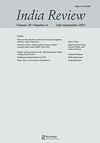World heritage tag and genealogy of WGEEP report: The intricacies in Western Ghats conservation
IF 0.5
3区 社会学
Q3 AREA STUDIES
引用次数: 0
Abstract
ABSTRACT United Nations Educational, Scientific and Cultural Organisation (UNESCO) strives to increase the number of natural World Heritage Sites to protect it from the onslaught of climate change and anthropogenic disturbances. The international community at the Paris Agreement on climate change in 2015 recognized reducing emissions from deforestation and forest degradation and the role of conservation, sustainable management of forests, and enhancement of forest carbon stocks in developing countries as one of the best low cost panacea for global environmental problems. India, in its Nationally Determined Contributions (NDCs) promised to increase its forest cover as an effort toward the mitigation of climate change. All these efforts are directed toward saving our Earth from the worst impacts of global warming. In the midst of these efforts, the conservation of Western Ghats is one of the central hotspots of biodiversity and deserves special attention. Thus, this paper looks into the questions how the Heritage Tag and Western Ghats Ecology Expert Panel (WGEEP) report causes intricacies in the conservation of Western Ghats? And why local inhabitants are so much apprehensive about the conservation of their region? This study proves that negligence in addressing the concerns and participation of affected stakeholders, from the framing of the conservation projects to its implementation, leads anti-conservation movements. Additonally, such conservation projects will never break ground and will remain on paper.WGEEP报告的世界遗产标签和谱系:西高止山脉保护的复杂性
联合国教育、科学及文化组织(UNESCO)致力于增加世界自然遗产的数量,以保护其免受气候变化和人为干扰的冲击。国际社会在2015年关于气候变化的《巴黎协定》上认识到,减少毁林和森林退化的排放,以及保护、可持续森林管理和增加发展中国家森林碳储量的作用,是解决全球环境问题的最佳低成本灵丹妙药之一。印度在其国家自主贡献中承诺增加森林覆盖率,以缓解气候变化。所有这些努力都是为了拯救我们的地球免受全球变暖的最严重影响。在这些努力中,西高止山脉的保护是生物多样性的中心热点之一,值得特别关注。因此,本文探讨了遗产标签和西高止山脉生态专家小组(WGEEP)的报告如何导致西高止山保护的复杂性?为什么当地居民对他们所在地区的保护如此担忧?这项研究证明,从保护项目的制定到实施,在解决受影响利益相关者的担忧和参与方面的疏忽导致了反保护运动。此外,这样的保护项目永远不会破土动工,而且会停留在纸上。
本文章由计算机程序翻译,如有差异,请以英文原文为准。
求助全文
约1分钟内获得全文
求助全文

 求助内容:
求助内容: 应助结果提醒方式:
应助结果提醒方式:


